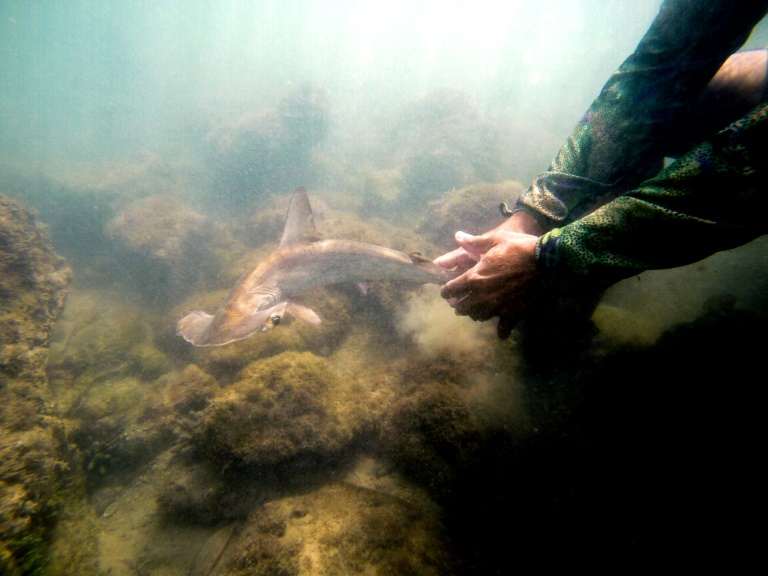In the Galapagos, an idyllic hammerhead shark nursery

A baby hammerhead shark is released by a member of the Galapagos National Park research team. Image: Pablo Cozzaglio / AFP
For millions of years, new-born hammerhead sharks have grown up in nurseries sheltered by the mangrove swamps and reefs of the Galapagos Islands, safe from all human threat.
But until November, biologists had no idea the sharks had their own hideaway that could hold some of the final secrets of this remote archipelago 1,000 kilometers (600 miles) off South America’s Pacific coast.
“It was quite by chance that we found this natural nursery for baby hammerheads, a species that is under a high level of threat,” said Eduardo Espinoza, the biologist in charge of monitoring ecosystems in the Galapagos Marine Reserve.
“It is a unique area, of great interest to conservationists,” he told AFP.
Still stunned by the find, Espinoza and his team are returning by boat to the spot in northeastern Santa Cruz, one of the main islands in the archipelago, to collect data and attach tracking devices to the young sharks.
The picturesque journey takes the scientists past sea turtles and white beaches where black marine iguanas sun themselves while enormous pelicans soar overhead, before their small boat winds its way down a narrow channel between the mangroves to a shallow, rocky pool.
Clearly visible in the water, dozens of small, silver-skinned sharks, one eye on either extremity of their T-shaped heads, glide gently among other species of fish, looking for the crustaceans they feed on during their early years.
“Pit stop” for sharks
“The females arrive to give birth and then leave. The young have all the food they need here and the reefs afford protection from large predators,” said Espinoza as he cast a wide net into the water.
After one or two years, when they grow and need more food, they make their way to the open ocean and can travel for thousands of kilometers, growing as long as three meters (yards) and living for up to 50 years.
The park rangers have for years been monitoring and tagging hundreds of sharks, one of the landmark species of the 138,000-square-kilometer (53,280-square-mile) marine reserve, the second-largest oceanic park in the world, which has been named a Natural Heritage Site.
But the discovery of these small sharks has been a particularly sensitive issue, as overfishing and the illegal capture of sharks has placed them on the list of endangered species, two levels below extinction, according to the International Union for the Conservation of Nature.
Their slow physical development and low reproduction rates have only exacerbated the threat.
That makes the operation to attach tracking devices all the more delicate.
“Shark, there to the right!” shouts one of the team members.
At this point, everything moves at a frantic speed.
The captain moves the boat closer to the net. One of the assistants grabs the shark, half a meter long, and holds it on a table so that Espinoza and the others can measure and weigh it, determine its sex and insert a tracking chip in its back so its habits and migration routes can be logged.
Putting the young shark back in the water, they move its head and tail to revive it, until it swims off on its own.
“They cannot spend more than two minutes out of water because they need a constant flow to avoid dying. It’s like a pit stop in Formula 1 racing,” said the biologist.
Extra protection
To save the hammerheads, the government of Ecuador, to which the islands belong, added an extra layer of protection in 2016 — a 38,000-square-kilometer sanctuary zone between Darwin and Wolf islands, where all fishing is banned.
The area is the mostly densely populated zone for shark populations in the world.
Jose Marin, a biologist at the Charles Darwin Foundation, an international scientific research NGO, said Ecuador was making “titanic efforts” in the field of conservation of sharks, whose fins are a highly prized delicacy in Asian cuisine.
“These studies, sometimes using satellite tracking, alert us to where these sharks are being caught when they leave the marine reserve, and allow us to notify other countries so they can help us protect them,” he said.
In August, a Chinese-flagged ship was intercepted in the Galapagos marine reserve with 300 tons of fish, including some hammerheads.
The Ecuadorean courts, which hand down stiff sentences for environmental crimes, sentenced the captain and his officers to three years in jail, and fined the owners of the ship $6 million. AB
RELATED STORIES:
Big cats in evolutionary arms race with prey – study
Rising Seine flushes out Paris rats as museums go on flood alert
Xiang Xiang the panda becomes latest example of Japanese overtime culture